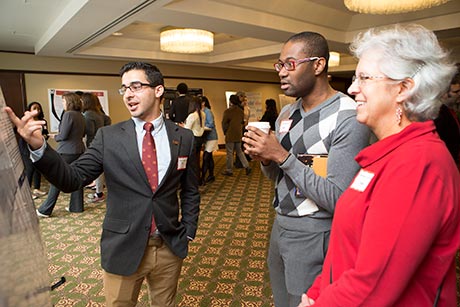15 undergraduates named McNair scholars
By Abigail Warren

Fifteen Cornellians were officially inducted into the Ronald E. McNair Post-baccalaureate Achievement Program at a ceremony April 11 in Statler Ballroom. The McNair Scholars Program is designed to prepare undergraduates from disadvantaged backgrounds for doctoral studies through involvement in research and other scholarly activities.
The McNair Scholars Program seeks to increase the number of first-generation, low-income or underrepresented students in doctoral programs and to diversify faculty in colleges and universities across the United States.
“For obvious reasons, the McNair program is not only important, but it is necessary. There is a disproportionate representation of individuals with Ph.D.’s and faculty of color (or any other marginalized group) within academia,” said McNair scholar Paola Muñoz ’17. “The implications that a Ph.D. has for a first-gen women of color is enormous.”
This year’s cohort is the third group of students to be inducted into the program. Avery August, Ph.D. ’94, professor of immunology and chair of the Department of Microbiology and Immunology in the College of Veterinary Medicine, delivered the keynote address.
August recounted his own personal journey to achieve his doctorate and eventually his position at Cornell. “I was very fortunate to meeting inspiring professors,” he said. At California State University, Los Angeles, August explained, he was introduced to research and decided he wanted to pursue a higher degree in science.
McNair scholars each have a faculty ‘McNair mentor’ who is part of a larger Cornell-based support network for scholars as they complete their undergraduate requirements to enhance eligibility for advanced-degree programs. Kimberly Cardenas ’17 said, “… just having such a wonderful network of support among the McNair staff has been so encouraging.”
The academic and research interests of this cohort of scholars are deep and eclectic. For example, scholar Abigail Shilvock ’17 works in the Kurpios Lab studying development of the lymphatic system in the midgut using chicken and mice embryos. She plans to enter an M.D./Ph.D. program.
Muñoz said, “Through the McNair program, I am able to study the extent through which the formation of a positive racial/ethnic identity provides a buffer against stereotype/social identity threat, and its residual impact on the intellectual development and performance of Knowledge is Power Program students.”
Another scholar, Consuelo Cuevas ’17, is majoring in applied engineering physics, minoring in game design and is hoping that her mentor Julia Thom-Levy, associate professor of physics will help her find her true calling in the vast universe physics contains.
Many scholars expressed their passion for learning. “I’ve found that I am most alive when I am learning, and hope I can someday offer that gift to others who have gone through the same hurdles that I had to go through,” Muñoz said.
“I think the McNair Scholars Program is crucial because of the incredibly low representation of students of color in doctoral programs,” said newly inducted scholar Kimberly Cardenas ’17. “Less than one percent of Latinos possess a Ph.D., and I want to help change that.”
“One day, I want to become a faculty mentor myself and encourage students who come from backgrounds like mine to change those statistics, “she continued.
The McNair program is named for NASA astronaut Ronald E. McNair, who died in 1986 during the launch of the space shuttle Challenger. It is one of eight federal TRIO programs, the U.S. Department of Education's oldest college preparation and student support effort..
Abigail Warren ‘15 is a writer intern for the Cornell Chronicle.
Media Contact
Get Cornell news delivered right to your inbox.
Subscribe